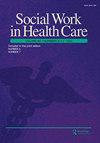Employing telehealth strategies for opioid addiction during COVID-19: implications for social work health care.
IF 2.1
4区 社会学
Q1 SOCIAL WORK
Social Work in Health Care
Pub Date : 2021-08-09
Epub Date: 2021-07-18
DOI:10.1080/00981389.2021.1953207
引用次数: 7
Abstract
ABSTRACT As the COVID-19 global pandemic continues, more than 40 states have reported increases in opioid-related mortality. The issue of service access and delivery poses a major concern for those struggling with mental illness and substance use disorders in the United States. To ensure the continuity of health care during the pandemic and the co-occurring opioid crisis, the United States continues to adapt its healthcare delivery strategies, which include the introduction of telehealth. Telehealth is a relatively new concept and requires rapid systems changes as well as adjustments from both service providers and recipients. The proper adaptation to the new service delivery method could result in process optimization and improved outcomes for those struggling with opioid dependency. This study aims to bring attention to the opioid crisis that may be overlooked in light of the global pandemic and encourage social workers and other mental health professionals to utilize modern technological advancements to improve service delivery to their clients. This paper offers a literature review with four themes: (1) a retrospect on pain and opioids, (2) current telehealth models and practical strategies, (3) social work roles and functions in telehealth care, and (4) next steps and implications of telehealth for social work as a much-needed health-care delivery tool at the clinical and community social work practice level.在COVID-19期间采用远程医疗策略治疗阿片类药物成瘾:对社会工作卫生保健的影响
随着COVID-19全球大流行的持续,40多个州报告了阿片类药物相关死亡率的增加。在美国,服务获取和提供的问题是那些与精神疾病和物质使用障碍作斗争的人关注的主要问题。为确保在大流行病和同时发生的阿片类药物危机期间的保健服务连续性,美国继续调整其保健服务战略,其中包括采用远程保健。远程保健是一个相对较新的概念,需要迅速改变系统以及服务提供者和接受者双方的调整。对新的服务提供方法的适当适应可能导致流程优化并改善那些与阿片类药物依赖作斗争的人的结果。这项研究的目的是引起人们对阿片类药物危机的关注,鉴于全球流行病可能被忽视,并鼓励社会工作者和其他精神卫生专业人员利用现代技术进步改善向客户提供的服务。本文对四个主题进行了文献综述:(1)疼痛和阿片类药物的回顾;(2)当前远程医疗模式和实践策略;(3)社会工作在远程医疗中的角色和功能;(4)远程医疗作为临床和社区社会工作实践层面急需的医疗服务提供工具,对社会工作的下一步工作和影响。
本文章由计算机程序翻译,如有差异,请以英文原文为准。
求助全文
约1分钟内获得全文
求助全文
来源期刊

Social Work in Health Care
SOCIAL WORK-
CiteScore
3.80
自引率
9.10%
发文量
25
期刊介绍:
Devoted to social work theory, practice, and administration in a wide variety of health care settings, this journal gives you the tools to improve your practice while keeping you up-to-date with the latest crucial information. Social Work in Health Care is edited by Gary Rosenberg, PhD, one of the most respected leaders in health social work. This creative, lively journal brings you the most important articles on research, leadership, clinical practice, management, education, collaborative relationships, social health policy, and ethical issues from the most respected experts in the field. The journal"s special issues comprehensively discuss a single pertinent health care theme.
 求助内容:
求助内容: 应助结果提醒方式:
应助结果提醒方式:


